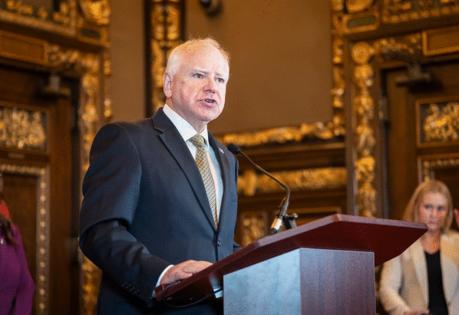State halts payments in 14 Medicaid programs over fraud, orders audit
Published in News & Features
Minnesota is pausing payments to providers in 14 Medicaid programs and is ordering a third-party audit of their billing as the state seeks to crack down on fraud.
The payment pause will last up to 90 days to give the state time to detect suspicious billing. DFL Gov. Tim Walz said Wednesday the state has contracted with health services and technology company Optum to analyze Medicaid claim data in these programs and flag issues to the Department of Human Services (DHS) for review. The one-year contract with Optum will cost $2.3 million, officials said.
“We cannot effectively deliver programs and services if they don’t have the backing of the public’s trust,” Walz said in a statement. “In order to restore that trust we are pumping the brakes on 14 programs that were created to help the most disadvantaged among us, yet have become the target of criminal activity.”
The move comes as several Republican candidates for governor are highlighting fraud cases, which they believe will be a major liability for Walz as he runs for a third consecutive four-year term.
Hundreds of millions of dollars have been stolen from state-run programs in recent years, starting with the swindling of $250 million in federal funds meant to feed children during the pandemic — known as the Feeding Our Future scheme — to more recent cases in Minnesota’s autism and housing services programs.
The Walz administration previously made moves to shut down the state’s Housing Stabilization Services program amid allegations of widespread fraud. That program is among the 14 the state identified Wednesday as being at high risk for billing irregularities or fraud.
Other affected programs include autism services, integrated community supports, nonemergency medical transportation, peer recovery services, adult rehabilitative mental health services and adult day services.
Personal care assistance and community first services and supports, recuperative care, individualized home supports, adult companion services, and intensive residential treatment services are also affected.
DHS leaders said they flagged the programs as high-risk based on evidence of fraudulent activity, program vulnerabilities, claim anomalies and other outlying factors.
“Criminals and the various schemes that they’ve concocted to defraud our Medicaid program have become more sophisticated, and it’s time for Minnesota to catch up,” DHS Temporary Commissioner Shireen Gandhi said. “While single actors and individuals used to be the norm, we are now seeing organized bands of providers gaming the system in concert.”
Gandhi said the agency’s assessment of Medicaid services is ongoing, and that more high-risk programs could be identified in the future. “I can’t promise you there won’t be another one,” she said.
Minnesota House Speaker Lisa Demuth, R-Cold Spring, said a fuller picture of the fraud that has occurred during Walz’s tenure is emerging.
“The fact that there are more than a dozen programs under suspicion proves that Walz’s fraud crisis is far worse, and far more widespread, than anyone was led to believe by the administration,” Demuth said Wednesday.
Demuth said the payment pause and audit are “encouraging” steps forward, but more action is needed, including creating a new Office of Inspector General to investigate fraud in state programs.
State Senate Majority Leader Erin Murphy, DFL-St. Paul, praised the actions taken by the Walz administration on Wednesday. She said it shows “he is not just talking about fraud, he is acting to stop it before it happens.”
“Fraud schemes are more sophisticated and organized than ever, and the third-party audit announced today will provide enhanced tools for Minnesota to tackle fraud,” Murphy said in a statement.
Optum will analyze claims in these programs over the next year and identify irregularities, such as abnormally high billing patterns or missing documentation, according to the governor’s office.
The Human Services department will investigate any claims flagged by Optum to confirm whether billed services were provided. Any improper claims will be referred to DHS’ Office of Inspector General for investigation.
“We are putting them through a pre-payment review,” Gandhi said. “If everything is fine, they will still be paid within the normal claims cycle.”
The external audit of Medicaid payments could mean longer wait times for providers to get paid. But officials said the state will still meet federal rules that require payment within 90 days.
The Association of Residential Resources in Minnesota, which represents more than 200 disability services providers in the state, expressed concern Wednesday that the broad payment pause could negatively affect people with disabilities.
“ARRM shares the Governor’s commitment to accountability and transparency,” Sue Schettle, the association’s CEO, said in a statement. “But pausing payments to legitimate providers for up to 90 days is not an accountability measure, it’s an existential threat to the care infrastructure that keeps Minnesotans with disabilities safe, housed, and supported in their community.”
________
©2025 The Minnesota Star Tribune. Visit at startribune.com. Distributed by Tribune Content Agency, LLC.







Comments